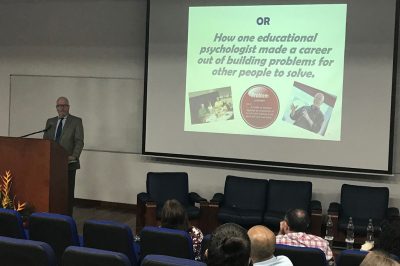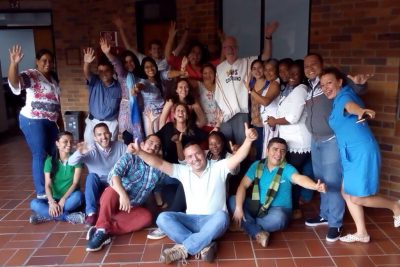
Since 2001, the Fulbright Specialist Program has been pairing a selection of top U.S. faculty experts and other professionals from a variety of disciplines with foreign host institutions for anywhere between two and six weeks to serve as consultants — sharing their knowledge and skills, and taking part in activities that support the host institution’s priorities and goals — while being immersed in other cultures.
Board of Trustees Distinguished Professor of Educational Psychology Scott Brown, who is certified as a Fulbright Specialist, accepted an assignment that sent him this past month to Pontificia Universidad Javeriana (Pontifical Xavierian University) in Cali, Colombia — one of the oldest universities in Colombia, founded in 1623.
Over the course of his two-week appointment, Brown taught two cohorts of Universidad Javeriana master’s degree students the principles of problem-based learning as part of a newly developed graduate degree program in psychology offered there. One of Brown’s former Neag School educational psychology doctoral students, Tatiana Rojas Ospina ’14 Ph.D., developed and directs the new program. Herself a 2010 Fulbright Scholar, Ospina now serves as a professor of psychology at Universidad Javeriana.
Brown also delivered an address on problem-based learning to the Universidad Javeriana’s president, dean of social science, and about 50 professors, in addition to taking part in a panel discussion on teaching and learning with six of the university’s faculty members.

“It has been a great experience, and it will certainly enhance my teaching, appreciation for diversity, and a new culture,” Brown says. “It has also enhanced some opportunities for research on GlobalEd 2 here in Colombia.”
GlobalEd 2 is a computerized, problem-based social studies game that gives middle-school students an opportunity to learn about geography, government, human rights, the environment, and other real-world issues by assigning classrooms to work remotely with other classrooms via online simulations, email, and web-based channels on negotiating international agreements on solutions to water resources, food security, climate change, and other socio-scientific topics. Brown is co-principal investigator on several GlobalEd 2 projects. This past year, he and co-principal investigator Kimberly Lawless ’94 MA, ’96 Ph.D., associate dean of research at University of Illinois at Chicago, received a three-year, $1.2 million grant in support of a project focused on continuing to refine the GlobalEd 2 Project on STEM literacy, which originally began nearly a decade ago with funding from the U.S. Department of Education’s Institute of Education Sciences (IES).
Related Stories:
 Facebook
Facebook
 Twitter
Twitter
 LinkedIn
LinkedIn
